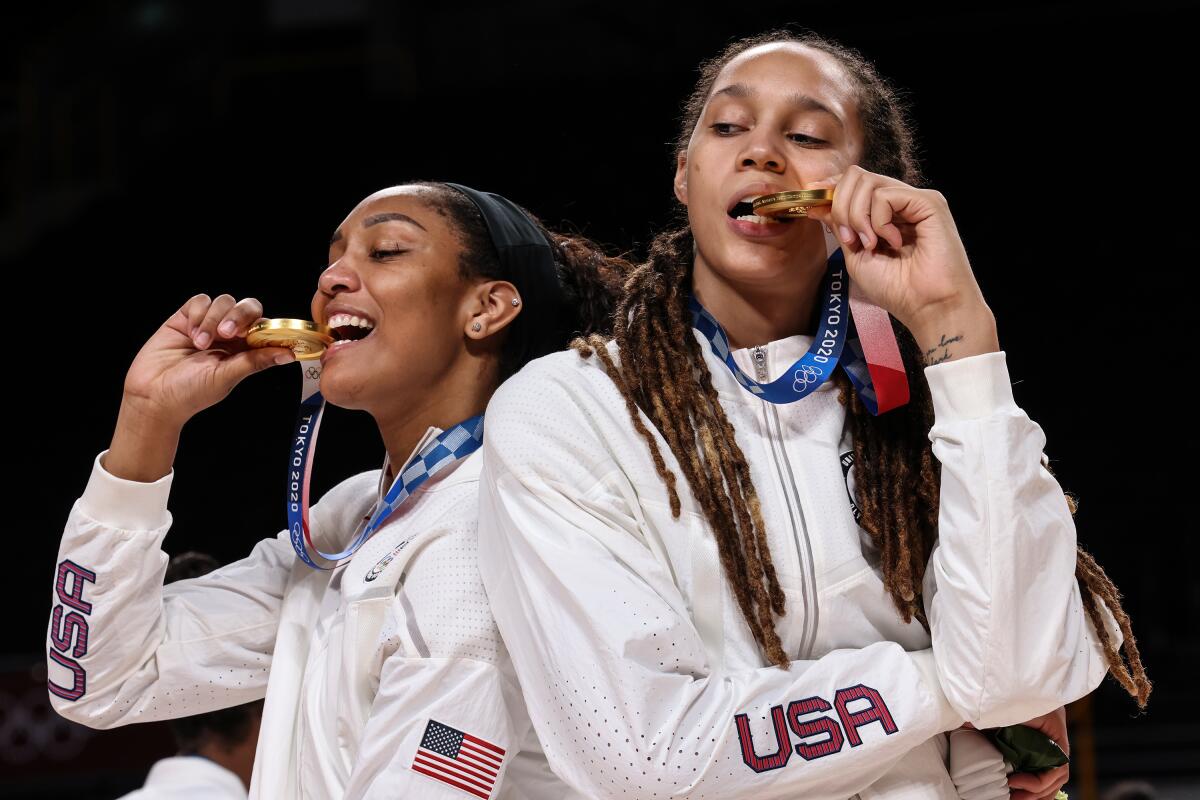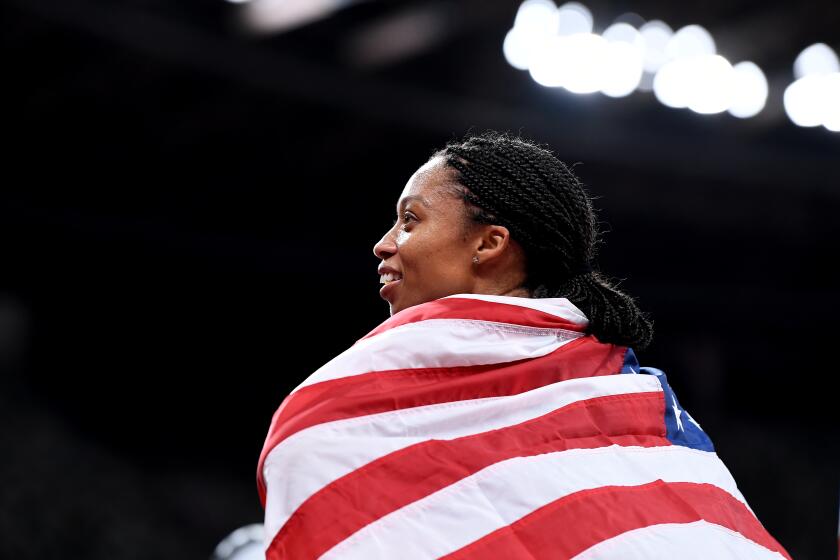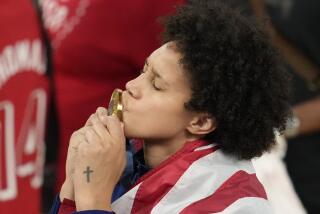Women at the Tokyo Olympics win big and prove there’s infinite beauty in sweat

- Share via
TOKYO — Before the women’s marathon was added to the program at the 1984 Los Angeles Olympics, the longest race for female runners was the 1,500 meters — and that became part of the Summer Games only in 1972. Delicate flowers couldn’t be expected to run long distances without doing unspecified but implied grievous harm to themselves or — heaven forbid — becoming sweaty.
During the Tokyo Olympics, which concluded Sunday, Sifan Hassan of the Netherlands won gold medals in the punishing 5,000- and 10,000-meter races and bronze in the 1,500 meters. The longest race was her last, and she won it by outkicking two rivals in the last 100 meters. Including preliminary rounds she ran nine races and completed 61 ¼ laps of Olympic Stadium. She won the 10,000 less than 24 hours after she had finished third in the 1,500 and five days after her victory in the 5,000. She ran a heat of the 1,500 the same day as the final of the 5,000.
No delicate flower was she. Nor were any of the other women at the Tokyo Games who soared, sprinted, swam, surfed, skateboarded, golfed, hurdled, biked, climbed rocks, tumbled, pitched, hit, dived, shot arrows, or stepped onto a beach or indoor volleyball court while comprising a greater percentage of Olympic competitors than ever before.
These Olympics were billed as the first gender-balanced Games, with 49% of the 11,656 athletes here being female. And women delivered many memorable moments in Games staged in an anxious, COVID-driven hush without the invigorating energy of fans.
Hassan pushed herself to nearly inhuman limits. On the medal stand after the 10,000 she said her only thought was, “It is over. Now you can sleep.” Gymnast Simone Biles brought mental health issues to the forefront when she developed “the twisties,” losing awareness of where she was in the air and withdrawing from most of her events to protect her physical and mental well-being. The U.S. women’s basketball team won its seventh straight gold medal as mainstays Sue Bird and Diana Taurasi became the first five-time basketball gold medalists. The U.S. women’s volleyball team defeated Brazil to win its first Olympic gold medal.
Weightlifter Hidilyn Diaz became the first Philippine athlete to win an Olympic gold medal. Triathlete Flora Duffy won Bermuda’s first Olympic gold medal. Los Angeles native Allyson Felix, competing in her fifth Olympics but first since becoming a mom, won her 10th and 11th medals and became the most successful American Olympic track and field athlete. Gymnasts from the Russian Olympic Committee won gold in the team event for the first time since 1992, when their delegation was called the Unified Team. Japan’s women’s basketball team won its first medal — silver — and delighted fans with its fast, fun, small-ball game.
With virtually all fans shut out from attending, the Tokyo Olympics had a sterile feel that often muted the outstanding accomplishments of the athletes.
That’s all worthy of the standing ovation they didn’t get at venues that were empty of spectators. One by one, team by team, these women may have saved the Games with their courage, talent, and advocacy of worthy causes such as Felix’s child care grants that support fellow athletes who are moms.
But their success raises two questions: What took the International Olympic Committee so long to promote equity, and why doesn’t a similar balance exist in the IOC’s power structure? Its executive board is only about 33% female and its committee membership is about 37.5% female. Before IOC President Thomas Bach sprains his arm patting himself on the back for pulling off these postponed and COVID-muted Games, he must erase that disparity.
Of China’s 88 medals, 47 were won by women. Women won 18 of Canada’s 24 medals and the telecast of the women’s soccer team winning gold drew 4.4 million viewers and was the most watched moment of the Olympics in Canada, according to the CBC. Women won seven of Jamaica’s nine medals. Of the 36 medals won by the Netherlands, 21 were won by female athletes.
The U.S. sent 626 athletes to Tokyo. It won 113 medals. Taking into account team and relay performances that count as one medal (even though each athlete receives a medal), 257 athletes contributed to the U.S. medal count, according to the U.S. Olympic and Paralympic Committee. Of that number, 164 were female and 93 were male.
“That’s a good statistic to know,” said U.S. basketball center Sylvia Fowles, who became a four-time gold medalist Sunday after the Americans defeated Japan 90-75 at Saitama Super Arena. “I’m happy that us women can do it. I think men can do it, too, but I think we do it a little bit better.”

Brittney Griner, who dominated the paint against Japan in scoring 30 points, also wasn’t aware of the extent of female athletes’ success in Tokyo. But she quickly saw bigger implications beyond raw numbers.
“Women power,” she said, smiling. “Didn’t know that, but it just shows that we can play, whatever sport it is. And it’s just growing even more.
“I know there’s a bunch of little girls at home that’s probably watching the Olympics and thinking, ‘I want to be like them.’ The Games just keep getting better across the board in every sport.”
Griner has played a part in that by offering an empathetic message to aspiring basketball players. “Be different. Love being different. The world would be boring if we were all the same,” she said. “And own it. I love being tall, love being bigger. Even to my 17 men’s shoe that I wear.”
Bird, 40, said these were her final Games; Taurasi, 39, was less definitive. Coach Dawn Staley paid tribute to them and the culture they enhanced with their staunch work ethic and all-consuming commitment to USA Basketball.
News, results and features from The Times’ team of 12 reporters who covered the Tokyo Olympic Games in the summer of 2021.
“The start of this winning occurred before them, but they finished it off,” said Staley, who declared this her Olympic finale after three as a player, two as an assistant coach and one as the first Black U.S. women’s basketball coach. “They took the torch and they took it to another level and they are putting so much pressure on the next coach and next players.”
That’s a good kind of problem. “In the ‘04 Games I was there to learn and take the torch from Dawn and carry it. The older players taught us what it meant,” Bird said. “And now from us, hopefully we’ve left some sort of legacy with the younger players where they have to carry that torch.”
Not every female athlete who competed here left with a medal. But they all left a legacy of strength that proves there’s infinite beauty in sweat.
More to Read
Go beyond the scoreboard
Get the latest on L.A.'s teams in the daily Sports Report newsletter.
You may occasionally receive promotional content from the Los Angeles Times.









